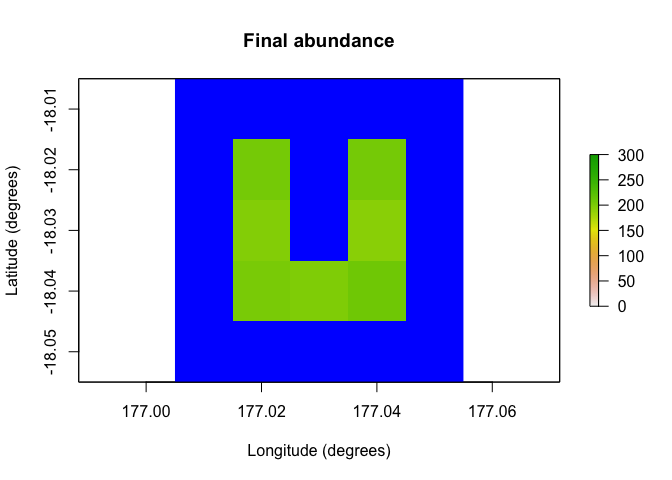The poems package provides a framework of interoperable R6 (Chang, 2020) classes for building ensembles of viable models via the pattern-oriented modeling (POM) approach (Grimm et al., 2005). Pattern-oriented modeling is a vigorous form of statistical validation in which simulations and their parameter settings are summarized using key metrics and converged toward multiple observed patterns, or targets.
The package provides a process-based population model related to the functionality of RAMAS or Vortex, but in a free and open source format, with high customizability. The package includes classes for encapsulating and generating model parameters, and managing the POM workflow. The workflow includes:
- Model setup including generated spatial layers and demographic population model parameters.
- Generating model parameters via Latin hypercube sampling (Iman & Conover, 1980).
- Running multiple sampled model simulations.
- Collating summary results metrics via user-defined functions.
- Validating and selecting an ensemble of models that best match known patterns.
By default, model validation and selection utilizes an approximate Bayesian computation (ABC) approach (Beaumont et al., 2002) using the abc package (Csillery et al., 2015). However, alternative user-defined functionality could be employed.
The package includes a spatially explicit demographic population model simulation engine, which incorporates default functionality for density dependence, correlated environmental stochasticity, stage-based transitions, and distance-based dispersal. The user may customize the simulator by defining functionality for translocations, harvesting, mortality, and other processes, as well as defining the sequence order for the simulator processes. The framework could also be adapted for use with other model simulators by utilizing its extendable (inheritable) base classes.
Installation
You can install poems from GitHub using:
# install.packages("devtools")
remotes::install_github("GlobalEcologyLab/poems")Example
The following simple example demonstrates how to run a single spatially explicit demographic population model using poems:
library(poems)
# Demonstration example region (U Island) and initial abundance
coordinates <- data.frame(
x = rep(seq(177.01, 177.05, 0.01), 5),
y = rep(seq(-18.01, -18.05, -0.01), each = 5)
)
template_raster <- Region$new(coordinates = coordinates)$region_raster # full extent
template_raster[][-c(7, 9, 12, 14, 17:19)] <- NA # make U Island
region <- Region$new(template_raster = template_raster)
initial_abundance <- seq(0, 300, 50)
raster::plot(region$raster_from_values(initial_abundance),
main = "Initial abundance", xlab = "Longitude (degrees)",
ylab = "Latitude (degrees)", zlim = c(0, 300), colNA = "blue"
)
# Set population model
pop_model <- PopulationModel$new(
region = region,
time_steps = 5,
populations = 7,
initial_abundance = initial_abundance,
stage_matrix = matrix(c(
0, 2.5, # Leslie/Lefkovitch matrix
0.8, 0.5
), nrow = 2, ncol = 2, byrow = TRUE),
carrying_capacity = rep(200, 7),
density_dependence = "logistic",
dispersal = (!diag(nrow = 7, ncol = 7)) * 0.05,
result_stages = c(1, 2)
)
# Run single simulation
results <- population_simulator(pop_model)
results # examine
#> $all
#> $all$abundance
#> [1] 977 1090 1238 1256 1341
#>
#> $all$abundance_stages
#> $all$abundance_stages[[1]]
#> [1] 574 643 755 731 847
#>
#> $all$abundance_stages[[2]]
#> [1] 403 447 483 525 494
#>
#>
#>
#> $abundance
#> [,1] [,2] [,3] [,4] [,5]
#> [1,] 59 134 157 147 173
#> [2,] 90 102 157 169 197
#> [3,] 133 156 192 202 191
#> [4,] 168 149 154 180 168
#> [5,] 163 180 178 193 192
#> [6,] 171 181 192 189 219
#> [7,] 193 188 208 176 201
#>
#> $abundance_stages
#> $abundance_stages[[1]]
#> [,1] [,2] [,3] [,4] [,5]
#> [1,] 28 76 100 83 108
#> [2,] 55 56 103 94 133
#> [3,] 83 91 108 121 115
#> [4,] 101 96 82 129 86
#> [5,] 95 109 113 102 141
#> [6,] 103 105 115 93 132
#> [7,] 109 110 134 109 132
#>
#> $abundance_stages[[2]]
#> [,1] [,2] [,3] [,4] [,5]
#> [1,] 31 58 57 64 65
#> [2,] 35 46 54 75 64
#> [3,] 50 65 84 81 76
#> [4,] 67 53 72 51 82
#> [5,] 68 71 65 91 51
#> [6,] 68 76 77 96 87
#> [7,] 84 78 74 67 69
raster::plot(region$raster_from_values(results$abundance[, 5]),
main = "Final abundance", xlab = "Longitude (degrees)",
ylab = "Latitude (degrees)", zlim = c(0, 300), colNA = "blue"
)
Further examples utilizing the POM workflow and more advanced features of poems can be found in the accompanying vignettes.
Citation
You may cite poems in publications using our software paper in Methods in Ecology and Evolution:
Fordham, D. A., Haythorne, S., Brown, S. C., Buettel, J. C., & Brook, B. W. (2021). poems: R package for simulating species’ range dynamics using pattern‐oriented validation. Methods in Ecology and Evolution, 12(12), 2364-2371.
References
Beaumont, M. A., Zhang, W., & Balding, D. J. (2002). ‘Approximate Bayesian computation in population genetics’. Genetics, vol. 162, no. 4, pp, 2025–2035. doi:10.1093/genetics/162.4.2025
Chang, W. (2020). ‘R6: Encapsulated Classes with Reference Semantics’. R package version 2.5.0. Retrieved from https://CRAN.R-project.org/package=R6
Csillery, K., Lemaire L., Francois O., & Blum M. (2015). ‘abc: Tools for Approximate Bayesian Computation (ABC)’. R package version 2.1. Retrieved from https://CRAN.R-project.org/package=abc
Grimm, V., Revilla, E., Berger, U., Jeltsch, F., Mooij, W. M., Railsback, S. F., Thulke, H. H., Weiner, J., Wiegand, T., DeAngelis, D. L., (2005). ‘Pattern-Oriented Modeling of Agent-Based Complex Systems: Lessons from Ecology’. Science vol. 310, no. 5750, pp. 987–991. doi:10.1126/science.1116681
Iman R. L., Conover W. J. (1980). ‘Small sample sensitivity analysis techniques for computer models, with an application to risk assessment’. Commun Stat Theor Methods A9, pp. 1749–1842. doi:10.1080/03610928008827996